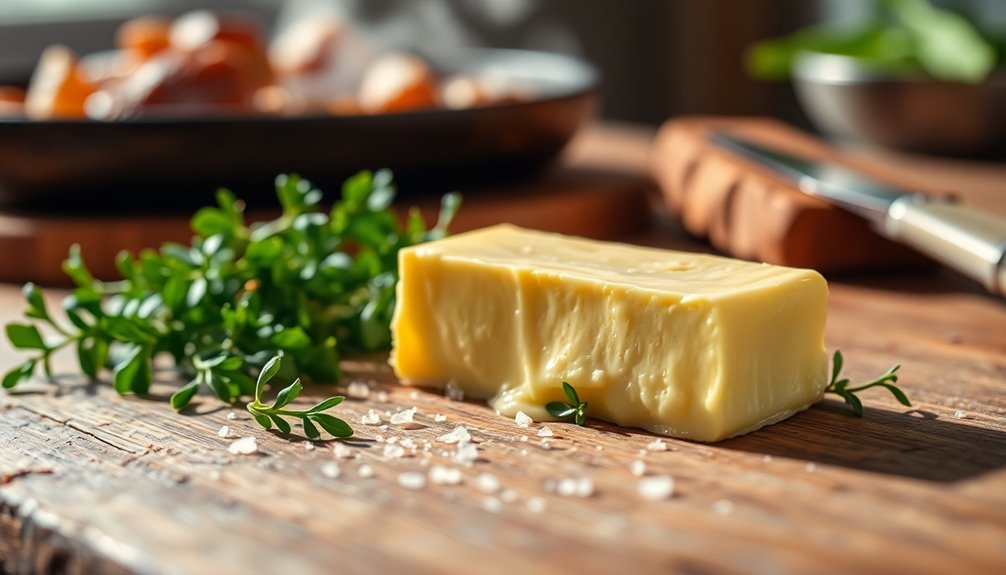As someone who is deeply passionate about skincare, I am always on the lookout for natural and nourishing ingredients. That is why mango butter has become a staple in my daily routine.
It’s a rich, creamy substance that is extracted from the seeds of the mango fruit. Packed with vitamins and antioxidants, this butter offers a multitude of benefits for the skin and hair.
In this article, we’ll explore the origins, composition, uses, and precautions of mango butter, as well as how it compares to other popular butters like shea butter.
Key Takeaways
- Mango butter is derived from the seeds of the mango fruit and has a rich history and cultural significance in Indian and Southeast Asian cultures.
- It is rich in essential fatty acids, antioxidants, and vitamins A and E, which help reduce signs of aging and deeply moisturize the skin.
- Mango butter is commonly extracted using the cold-pressing technique to retain its beneficial properties, while solvent extraction may result in nutrient loss.
- It is used in skincare products, hair care products, lip balms, and massage oils, and can also be used in homemade beauty products.
Origins of Mango Butter
You might be wondering where mango butter comes from. Well, let me enlighten you with a bit of history and cultural significance.
Mango butter is derived from the seeds of the mango fruit, which is native to the Indian subcontinent. The use of mango butter dates back centuries, with its origins deeply rooted in Indian and Southeast Asian cultures. In these regions, mango butter has been traditionally used in various ways, such as a cooking ingredient, a skin moisturizer, and even as a base for herbal remedies. Its rich history and cultural significance make mango butter a valued and cherished product.
Now that you have a glimpse into the origins of mango butter, let’s dive into its composition and nutritional value.
Composition and Nutritional Value of Mango Butter
The composition and nutritional value of mango butter make it a desirable ingredient for skincare products. Derived from the seed of the mango fruit, mango butter is rich in essential fatty acids, antioxidants, and vitamins A and E. Here are some benefits of using mango butter:
- Moisturizing: Mango butter deeply hydrates the skin, leaving it soft and supple.
- Anti-aging: The antioxidants present in mango butter help reduce the signs of aging, such as wrinkles and fine lines.
- Healing properties: Mango butter has healing properties that can soothe and repair damaged skin.
In addition to its skincare benefits, mango butter can also be used in DIY recipes to make homemade skincare products, such as body butters, lip balms, and hair masks. Its creamy texture and pleasant scent make it a popular choice for natural beauty enthusiasts.
Extraction Methods for Mango Butter
To extract mango butter, a common method involves the use of a cold-pressing technique. This method is preferred as it helps retain the beneficial properties of the mango fruit. Cold pressing refers to the process of mechanically separating the oil from the mango seed without the use of heat or chemicals.
The seeds are first cleaned and dried before being pressed to extract the butter. This method ensures that the butter retains its natural nutrients and vitamins. Another method that is sometimes used is solvent extraction, where a solvent is used to dissolve the butter from the seeds. However, this method may result in the loss of some valuable nutrients.
Overall, cold-pressed extraction is the preferred method to obtain high-quality mango butter.
Benefits and Uses of Mango Butter
When using mango butter in your skincare routine, you’ll notice its nourishing properties deeply moisturize your skin. Mango butter is a versatile ingredient that offers a range of benefits for your skin.
Here are some of the uses and benefits of mango butter:
-
Moisturizing: Mango butter is rich in fatty acids and antioxidants, which help to hydrate and replenish dry skin.
-
Anti-aging: The high levels of vitamin C and A in mango butter can help reduce the appearance of wrinkles and fine lines.
-
Soothing: Mango butter has anti-inflammatory properties, making it ideal for soothing irritated or sensitive skin.
Incorporating mango butter into your skincare routine can provide your skin with the nourishment it needs.
Now, let’s explore how mango butter compares to shea butter in terms of their benefits and uses.
Comparison Between Mango Butter and Shea Butter
If you’re wondering about the differences between mango butter and shea butter, let’s take a closer look at their benefits and uses.
Mango butter, derived from the mango seed, has numerous benefits for the skin. Rich in vitamins A and E, it deeply moisturizes and nourishes the skin, promoting a healthy glow. It also helps to soothe and heal dry, damaged skin, making it an excellent choice for those with eczema or psoriasis. Additionally, mango butter is known for its anti-aging properties, reducing the appearance of fine lines and wrinkles.
As for shea butter alternatives, mango butter is a great option. It has a similar consistency and moisturizing ability, but with the added bonus of a sweet, tropical scent.
How to Choose and Store Mango Butter
When it comes to choosing and storing mango butter, there are a few key factors to consider.
First and foremost, it’s important to store mango butter in a cool, dry place away from direct sunlight to maintain its quality and prevent it from melting.
Additionally, checking for quality indicators such as its color, texture, and scent can help ensure that you’re getting a high-quality product that will provide maximum benefits for your skin and hair.
Best Storage Conditions
The best way to store mango butter is in a cool, dry place to maintain its quality. This natural butter is sensitive to temperature and moisture levels, so it’s important to provide the optimal conditions for storage.
Here are some key points to consider:
-
Ideal temperature: Mango butter should be stored at a temperature between 60 and 75 degrees Fahrenheit. Avoid exposing it to extreme heat or cold, as it can affect its consistency and texture.
-
Moisture levels: Moisture is the enemy of mango butter, as it can cause it to spoil or become rancid. Store it in an airtight container to prevent moisture absorption and avoid placing it near any sources of humidity.
-
Avoid direct sunlight: Exposure to sunlight can degrade the quality of mango butter. Keep it away from windows or any other areas where it may be exposed to direct sunlight.
Quality Indicators to Consider
Now that we know the best storage conditions for mango butter, let’s dive into the quality indicators to consider when purchasing this amazing product. When it comes to shelf life, it’s important to note that mango butter has a relatively long shelf life compared to other natural butters. When stored properly, it can last up to two years. To ensure you’re getting a high-quality product, it’s essential to consider the packaging options available. A proper packaging, such as airtight containers or jars, can help protect the butter from exposure to light, air, and moisture, which can affect its quality over time. To help you understand the different packaging options, take a look at the table below:
| Packaging Option | Description |
|---|---|
| Glass Jars | Provides excellent protection against light and air |
| Plastic Tubs | Lightweight and easy to handle, but may not be as effective in blocking light |
| Metal Tins | Durable and can provide good protection against light and air |
| Vacuum Sealed Bags | Ideal for long-term storage, as they remove air to maintain freshness |
| Pump Bottles | Convenient for easy dispensing and preventing contamination |
Consider these factors when purchasing mango butter to ensure you’re getting a high-quality product with a longer shelf life.
Precautions and Potential Side Effects of Mango Butter
It’s important to be aware of the precautions and potential side effects of using mango butter. While mango butter is generally safe to use, there are a few precautions to keep in mind.
Here are some key points to consider:
-
Patch test: Before using mango butter, it’s recommended to do a patch test on a small area of your skin to check for any allergic reactions.
-
Allergic reactions: Although rare, some individuals may be allergic to mango butter. If you experience any itching, redness, or swelling after using mango butter, discontinue use and consult a healthcare professional.
-
Sensitivity to fragrance: Mango butter has a natural fruity scent, which can be strong for some people. If you have sensitivity to fragrances, consider using unscented or fragrance-free mango butter products.
Being aware of these precautions and potential side effects will help ensure a safe and enjoyable experience with mango butter.
Frequently Asked Questions
Can Mango Butter Be Used on All Skin Types?
Yes, mango butter can be used on all skin types. It has numerous benefits for dry skin, providing deep hydration and nourishment. To incorporate mango butter in your skincare routine, simply apply a small amount to cleansed skin and massage gently.
Is Mango Butter Safe to Consume?
Yes, mango butter is safe to consume. It offers numerous health benefits such as boosting immunity and aiding digestion. It can be used in cooking to add a rich and creamy texture to dishes like smoothies and desserts.
How Does Mango Butter Compare to Other Types of Butter, Such as Cocoa Butter?
When it comes to comparing mango butter to other types of butter, like cocoa butter, there are some key differences to consider. Mango butter offers unique benefits for the skin, making it a great choice for skincare routines.
Can Mango Butter Help With Skin Conditions Like Eczema or Psoriasis?
Mango butter is known for its benefits in treating dry skin conditions like eczema or psoriasis. It can be used in homemade skincare products, providing hydration and nourishment to the skin.
Are There Any Potential Allergic Reactions or Sensitivities to Mango Butter?
There can be potential allergic reactions or sensitivities to mango butter. It’s important to take precautions when using it, such as doing a patch test first and avoiding it if you have a known mango allergy.
Conclusion
In conclusion, mango butter is a versatile and nutritious product that has gained popularity in recent years. With its origins in tropical regions, it is extracted from the seeds of the mango fruit and is packed with essential fatty acids and antioxidants.
Not only does it have numerous benefits for the skin and hair, but it can also be used in cooking and as a natural remedy. When choosing and storing mango butter, it is important to opt for high-quality brands and keep it in a cool, dry place.
So, next time you come across mango butter, don’t hesitate to give it a try and experience its nourishing properties firsthand.









